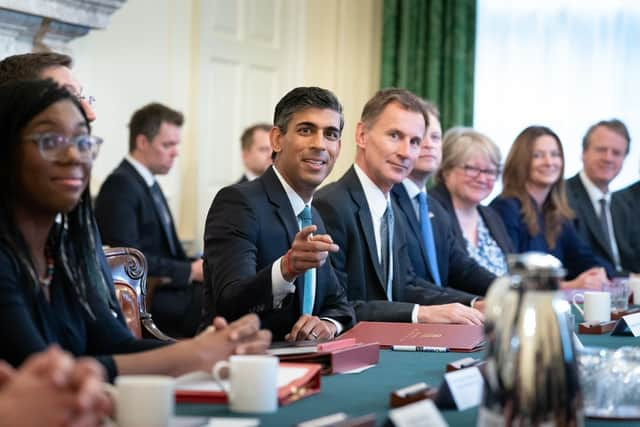UK recession: Economy shrinks in 'wake-up call' for Rishi Sunak as experts claim longest recession in a century has started
The Office for National Statistics (ONS) said gross domestic product (GDP) fell by 0.6 per cent in September, in part due to the Queen’s funeral.
It added to a 0.2 per cent drop for the full quarter – lower than had been expected as the ONS revised its estimates for July and August.
Advertisement
Hide AdAdvertisement
Hide AdThey are the biggest quarterly and monthly falls since early last year when the UK went back into lockdown to combat the Covid-19 virus, the ONS said.


The drop has been described as a “wake-up call” for Prime Minister Rishi Sunak and Chancellor Jeremy Hunt as they prepare to deliver the autumn statement amid brutal economic conditions on Thursday.
SNP shadow chancellor Alison Thewliss said: “These latest figures must serve as a final wake-up call for the Prime Minister and his Chancellor to deliver real support to protect struggling households and businesses, and ditch their austerity agenda.
“With a long and deep recession looming, the grim reality is that far too many people are frightened to open their bills, and are unable to put food on the table or heat their homes.
“These statistics are a damning indictment of the Tories’ disastrous economic record – driven by deep austerity, targeting of the most vulnerable in society, and imposing an extreme Brexit that has hammered the economy, trade and led to staff shortages.
“It’s beyond any doubt that only with the full powers of independence will we be able to properly tackle the cost-of-living crisis, escape Westminster control, and build a fairer and more prosperous future.”
If the economy also shrinks in the final three months of this year – as experts predict – it would push the economy into a recession that could last for two years.
It would also be the first time since 1975 the UK has gone from one recession to another so quickly, economists at the Resolution Foundation said.
Advertisement
Hide AdAdvertisement
Hide AdResearch director James Smith said: “Falling consumer spending has caused the economy to shrink in the third quarter of 2022. This has set Britain on course for the quickest return to recession in nearly half a century.”
The ONS said around half of that drop for September was due to the bank holiday on the day of the Queen’s funeral. Unlike most other bank holidays, there was no boost on that day for restaurants, pubs and tourist attractions as most businesses were closed, or reduced their opening hours.
ONS director of economic statistics Darren Morgan said: “With September showing a notable fall partly due to the effects of the additional bank holiday for the Queen’s funeral, overall the economy shrank slightly in the third quarter. The quarterly fall was driven by manufacturing, which saw widespread declines across most industries.
“Services were flat overall, but consumer-facing industries fared badly, with a notable fall in retail.”
The reading comes just a week after the Bank of England published a caveated forecast the UK might be headed for an eight-quarter recession – the longest consecutive recession since reliable records began in the 1920s. However, the bank warned this would only happen if it raises interest rates to around 5.2 per cent, which the market was expecting at the time.
The bank said it does not expect rates to reach such a high level, which would imply that the recession could be less drawn out. The September figure was worse than expected – analysts had forecast a 0.5 per cent drop during the month, according to Pantheon Macroeconomics.
However, the ONS changed its readings for August and July, helping for the quarter as a whole. The economy was previously thought to have shrunk by 0.3 per cent in August but that was revised to 0.1 per cent. In July the economy had previously thought to have risen by 0.1 per cent, but the ONS changed that to 0.3 per cent.
Chancellor Jeremy Hunt said: “We are not immune from the global challenge of high inflation and slow growth largely driven by [Vladimir] Putin’s illegal war in Ukraine and his weaponisation of gas supplies. I am under no illusion that there is a tough road ahead – one which will require extremely difficult decisions to restore confidence and economic stability.
Advertisement
Hide AdAdvertisement
Hide Ad“But to achieve long-term sustainable growth, we need to grip inflation, balance the books and get debt falling. There is no other way.”
Shadow chancellor Rachel Reeves said the latest GDP figures were “extremely worrying”. The Labour MP said: “Today’s numbers are another page of failure in the Tories’ record on growth, and the reality of this failure is family finances crunched, British businesses left behind, and more anxiety for the future.
“We’re already set to be near the bottom of global league tables on growth, but all the Tories offer yet again is austerity. Britain has so much potential to grow. We have the talent. We have the capacity.”
The Federation of Small Businesses said its members were particularly vulnerable to downturns in the economy. National chairman Martin McTague said: “The fall in GDP is one headline figure made up of countless bits of disappointing news for small businesses across the country – a new venue or premises they couldn’t open, a contract which ended unexpectedly, a staff member they had to let go.”
Comments
Want to join the conversation? Please or to comment on this article.